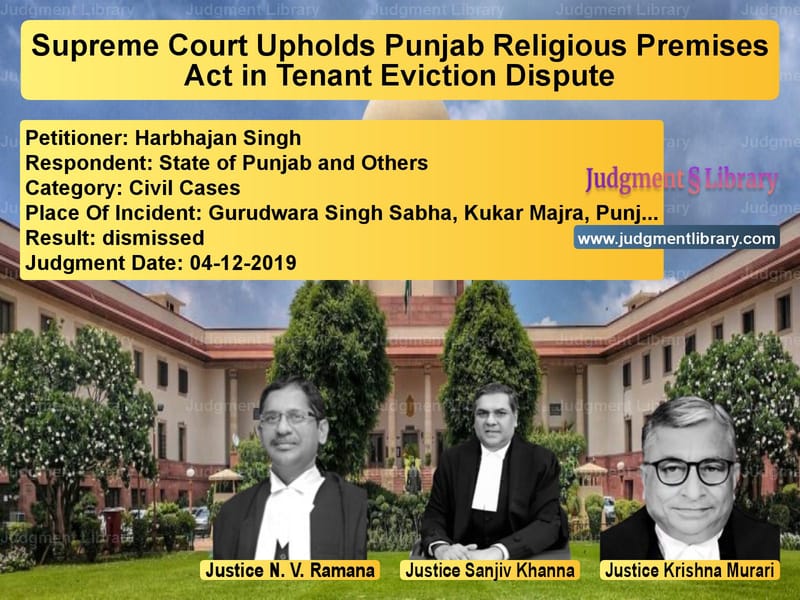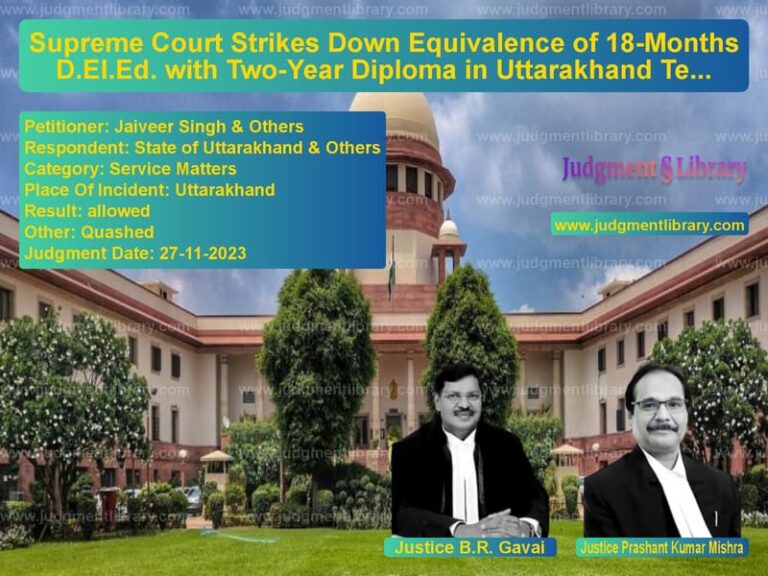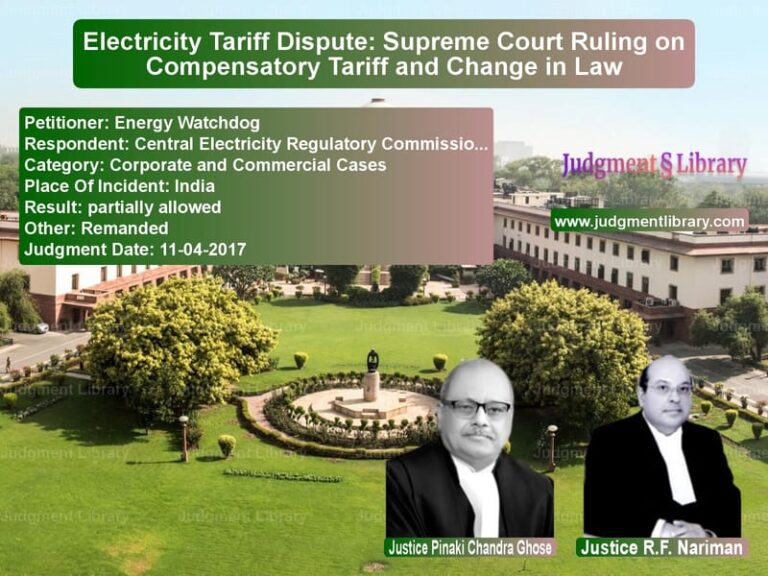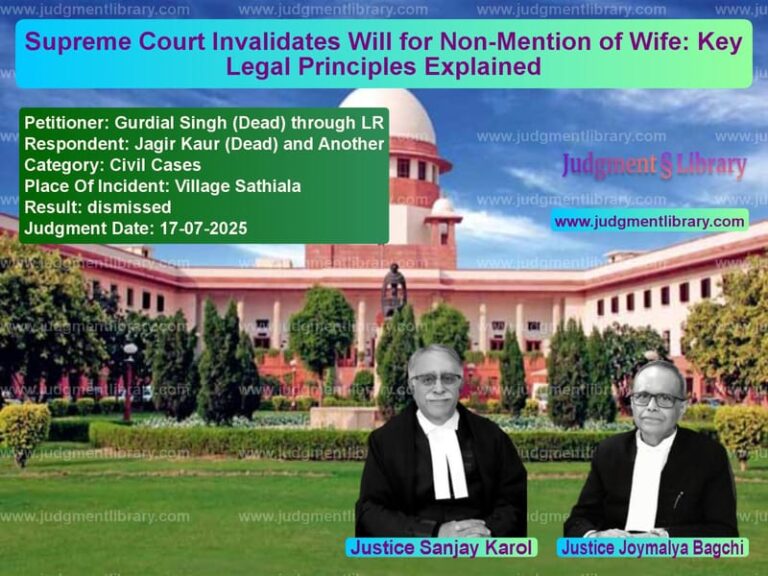Supreme Court Upholds Punjab Religious Premises Act in Tenant Eviction Dispute
The Supreme Court of India, in its landmark judgment in Harbhajan Singh Etc. v. State of Punjab & Others, upheld the validity of the Punjab Religious Premises and Land (Eviction and Rent Recovery) Act, 1997. This case involved a long-standing dispute between tenants occupying religious premises and the management of religious institutions. The Court’s ruling reaffirmed the power of religious institutions to reclaim their properties from unauthorized occupants.
Background of the Case
The dispute revolved around tenants who had been occupying shops in the Gurudwara Singh Sabha, Punjab, for several decades. The petitioners, Harbhajan Singh and others, were inducted as tenants between 1965 and 1969 under verbal agreements. The Shiromani Gurdwara Parbandhak Committee (SGPC) managed these properties and collected rent from the tenants. However, in 1997, the Punjab government introduced the Punjab Religious Premises Act, which empowered religious institutions to summarily evict unauthorized occupants.
In 1998, SGPC initiated eviction proceedings against the petitioners, citing their lack of formal tenancy agreements and the need to recover religious premises for institutional use. The tenants challenged the eviction, arguing that they were lawful occupants paying rent regularly and that the new law unfairly deprived them of their tenancy rights under the East Punjab Urban Rent Restriction Act, 1949.
Legal Issues Before the Supreme Court
- Whether the Punjab Religious Premises Act violated Article 14 of the Constitution by treating religious premises differently from other rental properties.
- Whether tenants occupying religious properties had legal protections similar to those under the general rent control laws.
- Whether SGPC’s actions in initiating summary eviction proceedings were justified under the law.
Arguments by the Petitioners
The tenants contended that:
- The Punjab Religious Premises Act unfairly discriminated against them by placing them outside the protections of the East Punjab Urban Rent Restriction Act.
- They had occupied the premises for decades and paid rent without any default, which should have granted them rights equivalent to those of regular tenants.
- The Act created a special category of landlords—religious institutions—which was arbitrary and violated the principle of equality.
- Eviction proceedings initiated by SGPC did not provide sufficient opportunity for defense and lacked procedural fairness.
Arguments by the Respondents
The SGPC and the State of Punjab argued that:
- The Act was necessary to protect the integrity of religious institutions and ensure that properties meant for religious and charitable purposes were not misused.
- Religious institutions required a distinct classification under the law as their properties were not commercial in nature.
- Allowing tenants to continue occupying religious premises indefinitely would hamper the management’s ability to use them for religious and community purposes.
- The summary eviction process under the Act was justified as it provided an efficient mechanism to address unauthorized occupation of religious properties.
Supreme Court’s Observations
The Supreme Court upheld the validity of the Punjab Religious Premises Act, ruling that it did not violate Article 14 of the Constitution. The Court emphasized the special status of religious institutions and the legitimate interest in safeguarding their properties. It relied on precedents such as Nallamilli Rami Reddi v. State of Andhra Pradesh and S. Kandaswamy Chettiar v. State of Tamil Nadu, where exemptions for religious properties from general tenancy laws were upheld.
Key Judicial Reasoning
- Legislative Competence: The Punjab legislature had the authority to enact laws specifically addressing religious premises.
- Special Classification: Religious institutions formed a separate category, justifying the application of different legal standards.
- Procedural Safeguards: The Act provided a clear procedure for eviction, including appeals before the Commissioner and judicial review by the High Court.
- Public Interest Consideration: The Court noted that protecting religious properties served a broader public purpose and was not an arbitrary action by the State.
Supreme Court’s Final Ruling
- The Punjab Religious Premises Act was held to be constitutionally valid.
- The tenants’ claims for protection under general rent control laws were rejected.
- The eviction proceedings initiated by SGPC were upheld.
- Religious institutions were recognized as having a distinct status, allowing them to reclaim their properties efficiently.
Implications of the Judgment
The ruling provides clarity on the rights of religious institutions to manage their properties without interference from tenancy laws applicable to commercial or private landlords. It sets a precedent affirming the constitutional validity of special classifications for religious premises, ensuring that these properties serve their intended religious and charitable purposes.
Conclusion
The Supreme Court’s decision reinforced the legal framework governing religious institutions and their properties. The judgment highlights the balance between property rights and the need to preserve the sanctity of religious institutions, ensuring that their premises are not indefinitely occupied by tenants lacking formal legal entitlements.
Petitioner Name: Harbhajan Singh.Respondent Name: State of Punjab and Others.Judgment By: Justice N. V. Ramana, Justice Sanjiv Khanna, Justice Krishna Murari.Place Of Incident: Gurudwara Singh Sabha, Kukar Majra, Punjab.Judgment Date: 04-12-2019.
Don’t miss out on the full details! Download the complete judgment in PDF format below and gain valuable insights instantly!
Download Judgment: Harbhajan Singh vs State of Punjab and Supreme Court of India Judgment Dated 04-12-2019.pdf
Direct Downlaod Judgment: Direct downlaod this Judgment
See all petitions in Property Disputes
See all petitions in Landlord-Tenant Disputes
See all petitions in Specific Performance
See all petitions in Damages and Compensation
See all petitions in Contract Disputes
See all petitions in Judgment by N.V. Ramana
See all petitions in Judgment by Sanjiv Khanna
See all petitions in Judgment by Krishna Murari
See all petitions in dismissed
See all petitions in supreme court of India judgments December 2019
See all petitions in 2019 judgments
See all posts in Civil Cases Category
See all allowed petitions in Civil Cases Category
See all Dismissed petitions in Civil Cases Category
See all partially allowed petitions in Civil Cases Category







